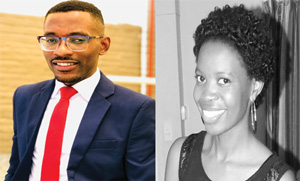
A case of selective discrimination

By Marbeline Goagoses.
Not to bring the skeletons out of the closet, but I have a point.
A couple of decades ago, but soon enough that we still have a vivid recollection of it, the world was introduced to something called Apartheid.
Apartheid, which started in South Africa, from 1948 to 1994, was a system of racial segregation under which the all-white government of South Africa, oppressed non-white South Africans.
Through this policy, the white South Africans dictated how non-white South Africans, which were the majority of the population, were going to live and how they were going to live.
Now, because South African Apartheid laws were extended to Namibia, Namibia was directly affected by the Apartheid South system, and like in South Africa, black Namibians were restricted from having any political rights, as well as social and economic freedoms!
Irrational racial fears and attitudes lead to the setting up of laws that were designed to do one thing. To keep the black people in their own designated spaces, to be on their own, to develop on their own, to be separate from a society or group that had decided that they owned the rights to who was to be superior in race. For some reason, they were “right” and blacks were “wrong.”
I am sure, that there is no one in Namibia, who does not know the history of Apartheid in South Africa, and by extension the practices of Apartheid in Namibia.
To make a long story short, in 1994, Nelson Mandela became president of South Africa, after 27 years in prison, and put an end to the Apartheid nonsense, legally in 1997.
But I digress. This article is not about a history lesson on the Apartheid regime of South Africa and by extension, Namibia.
This article is about how quickly we have forgotten that not so long ago, we, as a country, as a society, as a human race, and as individuals, were at the receiving end of gross Human Rights Violations. The worst kind of discrimination the world has ever witnessed.
Lest we forget, let’s recap what discrimination means. According to the Oxford Dictionary, discrimination is the unfair or prejudicial treatment of people and groups based on characteristics such as race, gender, age, or sexual orientation.
Much like the kind that has led some activists and the Namibian Church to have the most dramatic condemnations and protests after The Supreme Court of Namibia ruled in favour of recognizing same-sex marriages from other countries, in Namibia!
This decision makes Namibia only the second nation on the continent to do so after South Africa. South Africa! The country that endured years and years of Apartheid under White Supremacy rule, is one of the countries where Lesbian, gay, bisexual, and transgender (LGBTQ) people enjoy the same legal rights as non-LGBTQ people.
Probably, exactly because they understand the notion and idea of discrimination and suppression! And so should we! Imagine someone had an issue with you based on the colour of your skin! Imagine someone had a problem with you because of who you decided to have sex with.
I don’t know, if the Church knows, why the Church has a problem with the LGBTQs in Namibia. Like, what exactly is the issue? The answer is, there is no issue. If you think about it, who does not have a family, a friend, a co-worker, or an acquaintance that is gay? Do they then “hate” them as individuals, or does it only count when it is the collective?
In my opinion, the Church is having this strong adverse reaction to this decision mainly because the Church thinks that this is what the nation and the congregation expect them to do. It is about showing face. It is about maintaining the narrative or perception of being on the high and invisible pedestal of moral superiority and righteousness.
Eckhart Tolle, in his book, A New Earth, writes, “The history of Christianity is a prime example of how the belief that you are in sole possession of the truth, that is to say, right, can corrupt your actions and behaviour to the point of insanity. For centuries, torturing and burning people alive if their opinion diverged even in the slightest from Church doctrine or narrow interpretations of scripture (the “Truth”) was considered right because the victims were “wrong.”
It is not necessary! When religion becomes ideology and creates an illusory sense of superiority it creates division and conflict between people. It becomes the US, against THEM situation, where YOU are WRONG, and because I am in this position of SUPERIORITY, I am RIGHT, and also better than you!
There is NO LGBTQ community! There are only Namibians. There are only humans, and individuals making life decisions, and someone, or in this case, a group, standing in their way of living their lives as they wish, because they have declared themselves to be “right”!
This kind of thinking is quite the opposite of what the church should stand for! It is Apartheid all over again! Just in a different context! What’s next? Gender? Oh wait, we were already there! When will it end?
The Church has a powerful influence, and through this influence, the Church must use, as a matter of responsibility, its congregation, to implement social change. Not to cause further division.
The Church will be better served to take up a more prominent or visible role in society and actively participate in the minimization of social ills like domestic violence, rape, including the rape of minor children, poverty, alcohol and drug abuse, and baby dumping, amongst others.
Live and let live, and let that living be in LOVE.











































